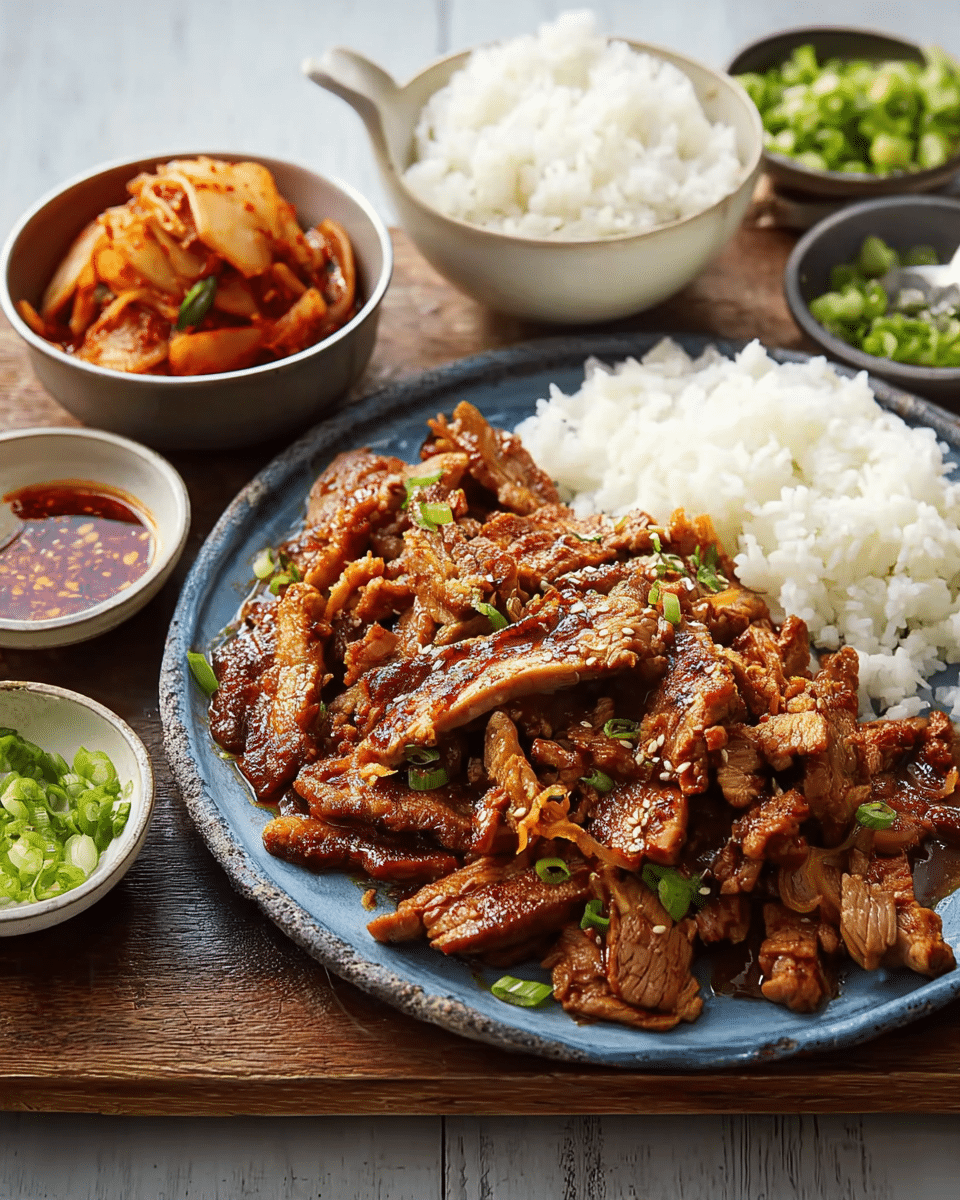Korean BBQ Pork is a flavorful dish made with marinated, thinly sliced pork cooked in a savory-sweet sauce. The pork is tender and crispy, thanks to the high-heat stir-frying, while the rich sauce made with gochujang (Korean red chili paste), soy sauce, and other spices adds layers of umami and a mild spicy kick. This dish is perfect for a weeknight dinner or a special occasion and pairs beautifully with rice and vegetables.
Full Recipe:
Ingredients
-
1 ½ pounds pork shoulder, sliced very thin
-
2 tablespoons green onion, diced
-
5 cloves garlic, minced
-
1 teaspoon ginger, minced
-
½ cup Korean red chili paste (Gochujang)
-
1 teaspoon red pepper flakes (optional for extra heat)
-
¼ cup soy sauce
-
3 tablespoons rice vinegar
-
1 tablespoon sesame oil
-
1 tablespoon sugar
-
1 teaspoon black pepper
-
1 tablespoon canola oil (for cooking)
-
Sesame seeds, for garnish
Directions
-
Prepare the Marinade:
-
In a large bowl, mix the sliced pork, green onion, garlic, ginger, gochujang, red pepper flakes, soy sauce, rice vinegar, sesame oil, sugar, and black pepper.
-
Cover the bowl and marinate the pork in the refrigerator for 30 minutes to 1 hour.
-
-
Cook the Pork:
-
Heat 1 ½ tablespoons of oil in a large skillet or wok over medium-high heat.
-
Add the marinated pork in batches (to avoid overcrowding) and cook for 3-5 minutes until the pork is browned and slightly crispy.
-
Remove the pork from the skillet and set it aside. Repeat the process with the remaining pork.
-
-
Finish and Serve:
-
Once all the pork is cooked, return it to the skillet, stirring to combine.
-
Garnish with sesame seeds and serve with rice or vegetables.
-
Nutrients
-
Calories: 248 kcal per serving
-
Carbohydrates: 13g
-
Protein: 21g
-
Fat: 35g
-
Saturated Fat: 10g
-
Cholesterol: 82mg
-
Sodium: 778mg
-
Fiber: 1g
-
Sugar: 9g
-
Vitamin A: 104 IU
-
Vitamin C: 7mg
-
Calcium: 45mg
-
Iron: 2mg
The Magic of Gochujang and Other Key Ingredients
At the heart of Korean BBQ Pork lies gochujang, a fermented Korean red chili paste that combines heat, umami, and a touch of sweetness. Gochujang is a signature ingredient in Korean cuisine and provides the dish with its signature flavor. The soy sauce adds saltiness and depth, while rice vinegar brings a subtle acidity to balance the richness of the pork. The sesame oil imparts a nutty fragrance, elevating the overall flavor profile, and sugar helps to create a perfect harmony between the salty and sweet elements of the dish.
Other key ingredients like garlic, ginger, and green onion bring aromatic complexity to the marinade, making each bite a delightful experience. The red pepper flakes can be added for those who enjoy an extra level of heat, but they are optional based on your spice tolerance. These ingredients come together to create a marinade that makes the pork flavorful, tender, and perfect for stir-frying.
The Importance of Thinly Sliced Pork
Using pork shoulder sliced very thinly is essential to creating the tender texture that makes this dish so delicious. Pork shoulder is known for its flavor and tenderness, and when sliced thinly, it cooks quickly, allowing the marinade to infuse deeply into the meat. Thin slices also ensure that the pork becomes crispy when stir-fried at high heat, which adds a delightful contrast to the juicy, flavorful interior.
The stir-frying method used in this recipe is essential for creating the slightly crispy exterior while keeping the inside tender and juicy. By cooking the pork in batches, you prevent overcrowding the skillet, which ensures that each piece gets the right amount of contact with the hot pan, leading to a beautifully caramelized and crispy texture.
The Cooking Process: Quick and Delicious
Making Korean BBQ Pork is surprisingly simple and quick. After preparing the marinade and allowing the pork to marinate for 30 minutes to 1 hour, the pork is stir-fried in a hot skillet or wok. Cooking the pork in batches ensures that it has enough space to caramelize and get crispy, which is key to developing the best texture and flavor.
Once all the pork is cooked, it is returned to the skillet, allowing it to reheat and combine with any leftover marinade in the pan. This process helps the pork absorb more of the flavorful sauce and ensures that every bite is rich and full of taste. The final step is to garnish the dish with sesame seeds, which add a touch of crunch and a nutty flavor that complements the pork perfectly.
Serving Suggestions for Korean BBQ Pork
Korean BBQ Pork is a versatile dish that can be served in a variety of ways. The most common and traditional pairing is with steamed rice, which serves as a neutral base to soak up the flavorful sauce and help balance the richness of the pork. You can also serve the pork with vegetables like sautéed spinach, kimchi, or stir-fried carrots and bell peppers to add freshness and texture to the meal.
For a lighter option, you can serve the pork in lettuce wraps. The crispy pork pairs beautifully with the cool crunch of fresh lettuce, creating a refreshing contrast that adds to the meal’s balance. These wraps can be garnished with additional green onions and sesame seeds for extra flavor.
This dish also pairs well with a simple cucumber salad or pickled vegetables, which add acidity and freshness to balance the savory richness of the pork. The sweet-spicy flavor profile of the pork makes it an excellent companion for cold side dishes that offer a crisp, refreshing contrast.
Nutritional Information and Health Considerations
Korean BBQ Pork offers a balanced combination of protein, fat, and carbohydrates, making it a satisfying meal. Each serving provides 21g of protein, thanks to the pork, which is great for muscle repair and overall health. The fat content is relatively high (35g per serving), but this is primarily due to the oil used in cooking and the natural fat content in the pork shoulder, which helps to keep the meat tender and flavorful.
The dish contains 13g of carbohydrates, mostly from the rice or vegetables it’s served with. The sodium content (778mg per serving) is on the higher side, mainly due to the soy sauce and gochujang. If you’re concerned about sodium intake, you can use a low-sodium soy sauce or reduce the amount of fish sauce used in the recipe. Additionally, the dish contains a small amount of fiber (1g per serving) and sugar (9g) from the brown sugar in the marinade.
The vitamin and mineral content of the dish includes vitamin A (104 IU), vitamin C (7mg), calcium (45mg), and iron (2mg), thanks to the inclusion of garlic, ginger, and green onions. These ingredients contribute some antioxidant benefits and add freshness to the dish.
Conclusion
Korean BBQ Pork is a flavorful and satisfying dish that’s easy to prepare and perfect for any occasion. The tender, caramelized pork, combined with the savory-sweet marinade, offers a delicious balance of flavors that’s both comforting and vibrant. Whether served with rice, vegetables, or in lettuce wraps, this dish is versatile, quick, and perfect for a weeknight dinner or a special meal to impress guests. The combination of gochujang, soy sauce, sesame oil, and garlic creates a mouthwatering dish that captures the essence of Korean cuisine. Garnished with sesame seeds and served alongside steamed rice or fresh vegetables, Korean BBQ Pork is sure to become a favorite in your cooking repertoire.






